Want your online business to go global? Besides Google, there are many other international search engines that you can utilize. If you’re targeting multiple countries, it’s important to know these search engines and optimize them accordingly.
This article will discuss the 15 best search engines that you can optimize for your multi-language website, as well as the steps you can take to optimize the web!
#1 Google

Have you ever imagined life without Google? It’s hard, isn’t it? Google has become an integral part of our daily lives.
Google is not just another search engine. It is capable of providing unlimited information. No wonder Google is the most popular website today, with more than 276 billion hits every month.
But Google doesn’t stop there. It continues to innovate, providing services that make our lives easier. There’s Google Maps, which guides us to our destination, Google Translate, and Cloud AI Translate, which handles translations.
And the latest is Gemini, a popular AI brand today that is no less interesting than ChatGPT.
- Widely used in countries: in the USA, India, Brazil, the UK, Japan, Indonesia, Germany, Mexico, France, Canada, etc.
- Pros: Highly accurate and relevant search results, excellent search speed, integrated additional features (maps, translation, etc.), simple and easy-to-use interface, and multiple languages available.
- Cons: Concerning privacy and user data issues, high dependency that can limit exploration of other information sources, market dominance that can hinder competition
#2 Bing

For those of you who are never separated from Google every day, the name Bing may not be so familiar. However, make no mistake; Bing is also a search engine that has been around since 2009.
Although its market share was only about 3.74% in July 2024, it was still far below Google. However, if you’re a visual lover, Bing might be a suitable solution. It is capable of sophisticated image and video searches!
But there’s more to it! Have you ever been paid to search? Yes, Bing gives you a rewards program in the form of points every time you perform a search. These points can be exchanged for exciting prizes or even donated to charity.
Just like Google gave birth to Gemini, Bing also doesn’t want to be left behind in the AI revolution. In early 2023, they introduced an AI assistant called Copilot (originally known as Bing Chat). As with any AI, it can engage in dialog and even help you generate content.
- Widely used in countries: China, United States, Germany, France, Japan, India, and others.
- Pros: Advanced and better visual and video search than Google, attractive rewards program, integration of AI (Copilot) and other Microsoft products. Clean and easy-to-use interface
- Cons: Much smaller market share than Google, still less popular in many countries, considered an “alternative” by many users, less effective for very specific or technical searches than Google.
#3 DuckDuckGo
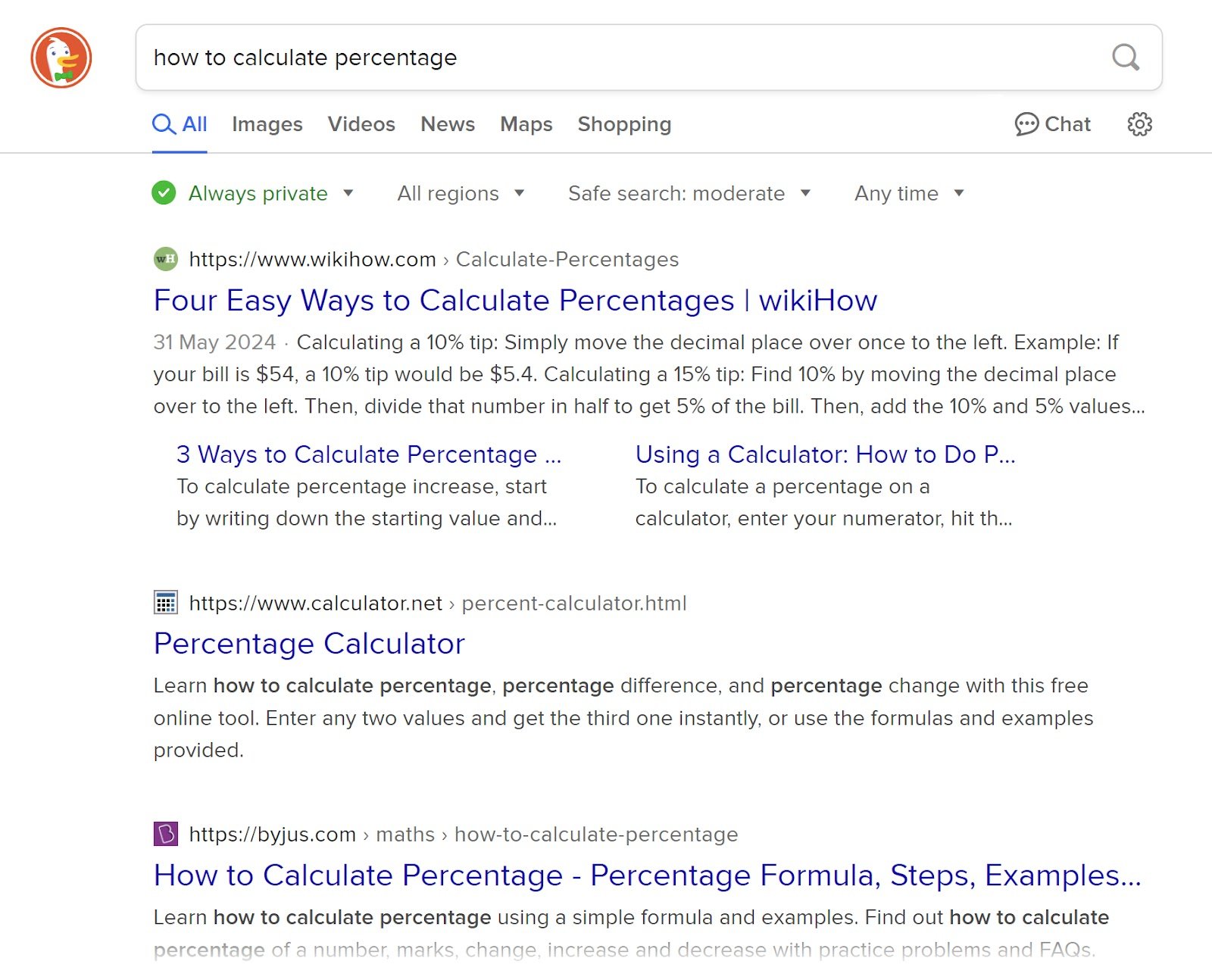
If you are concerned about data privacy when searching, consider using this search engine.
DuckDuckGo not only provides information but also allows users to browse without a trace. With the slogan “Privacy, simplified,” DuckDuckGo is not just a search engine; it truly advocates for the right to privacy in the digital world.
On average, DuckDuckGo processes about 100 million daily searches. This may still fall short of giants like Google, but it shows that more and more people are concerned about their online privacy.
What makes this search engine special is that it does not track, collect or store your data. There are no user profiles, no saved search history, and of course, no ads following you from site to site.
- Widely used in countries: USA (highest users), Germany, France, UK, Europe,
- Pros: It is very protective of user privacy with no tracking, unbiased search results based on search history, and features “bang” commands for quick searches on specific sites. There are no personalized ads or following users.
- Cons: Search results may be less relevant than personalized search engines, still less popular in some countries, and there is no advanced image search feature like on Google and Bing. Some users may feel deprived of the personalization that other search engines offer.
#4 Yahoo

Yahoo! has been an online search engine for quite some time. Launched in 1995, it was one of the pioneers who paved the way for the digital revolution that we enjoy today.
Although times have changed and Google now dominates, Yahoo! has survived and continues to evolve. Interestingly, while Yahoo! still retains its identity, its search engine is now powered by Microsoft’s Bing. So, don’t be surprised if you find similarities in their search results.
However, Yahoo! still has its unique touch. One of Yahoo!’s key strengths is its diversification. Besides web search, Yahoo! offers a still-popular email service, a comprehensive news portal, and Yahoo! Finance, which is a reference for many investors, etc.
- Widely used in countries: United States, Taiwan, Canada, United Kingdom, France, and others.
- Pros: Bing-powered search results, which provide an alternative to Google, personalized news and content features, and good integration between various Yahoo!
- Cons: Relatively small search market share compared to major competitors, display ads sometimes perceived as too prominent, quality of search results may not be as consistent as Google, search features less innovative than Google or Bing.
#5 Baidu

The next search engine is Baidu. If you haven’t heard of it, think of it as China’s ‘Google’. But Baidu is not just a copycat; it uses technology with its character, which has captured the hearts of more than half of China’s internet population.
As of July 2024, Baidu controls 57.76% of the search market share in China. This figure may be familiar if you know the size of the Chinese internet market.
Like Google in Western countries, Baidu has also developed supporting products, such as Maps to navigate Beijing’s busy streets, news services to keep up with the latest developments, and encyclopedias to satisfy curiosity. Baidu offers it all.
What makes Baidu special and different from others is its focus on Chinese language and culture. Its search algorithm is specifically designed to understand the nuances of the Chinese language and Chinese culture. However, it’s important to remember that in China, the internet is heavily regulated. This means that some content may be censored or blocked.
- Widely used in countries: China (main use), Taiwan, Hong Kong, Japan, US, and countries with significant Chinese populations.
- Pros: Strong market dominance in China, excellent optimization for Chinese language and culture, good choice for businesses with Chinese target market, better understanding of local context than global search engines, comprehensive integration of services (maps, news, encyclopedia, etc).
- Cons: content censorship and access restrictions, less effective for global searches or in non-Chinese languages, potential bias in search results due to government influence, less familiar to users outside China.
#6 Ecosia
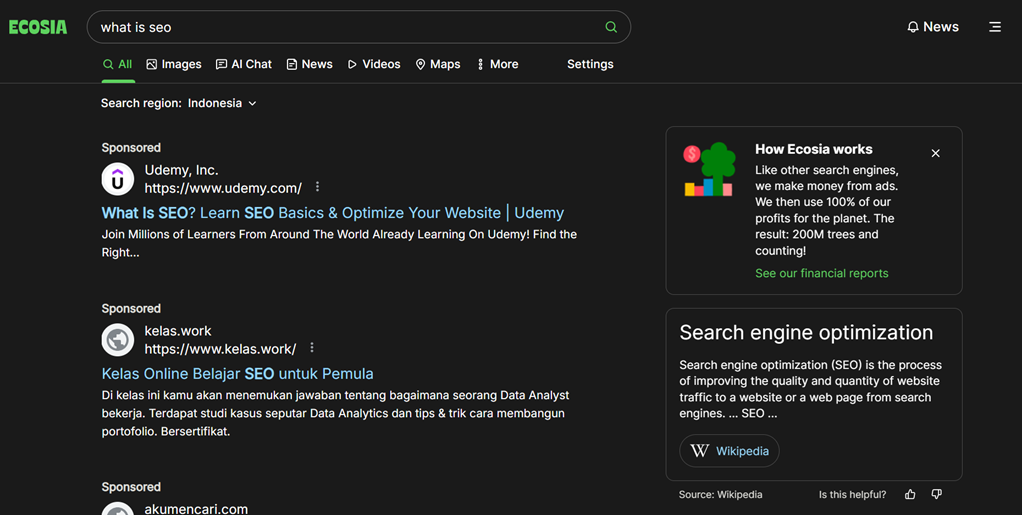
Different from other search engines, Ecosia offers a more valuable experience than just online search. It is a unique blend of technology and environmental awareness. Imagine that every time you type a query in the search box, you are also planting a tree seed for our earth. This is the essence of Ecosia.
Moreover, Ecosia is very transparent about its revenue and shares monthly financial reports. Ecosia is not just about planting trees. It is a non-profit company fully committed to transparency. The money from the ads that appear in the search results is used to fund tree planting around the world.
In addition to standard search results, Ecosia offers interesting features such as quick links to Wikipedia, Amazon and even Google. This allows users to explore different sources of information.
To date, Ecosia has planted more than 210 million trees and allocated 85 million euros to climate action. These numbers are not just statistics – they are tangible proof of the positive impact we can make through simple actions like online searches.
- Widely used in countries: Germany (home country), France, UK, US, and others.
- Pros: It directly contributes to environmental conservation through tree planting, has high financial transparency, and offers good search quality as it uses Microsoft Bing technology. It does not track users’ search history, respects privacy, and is available as a browser extension for easy access.
- Cons: relatively small market share compared to major search engines, may be less effective for very specific or technical searches, reliance on Microsoft Bing for search results, may have fewer specialized features compared to major search engines
#7 Startpage
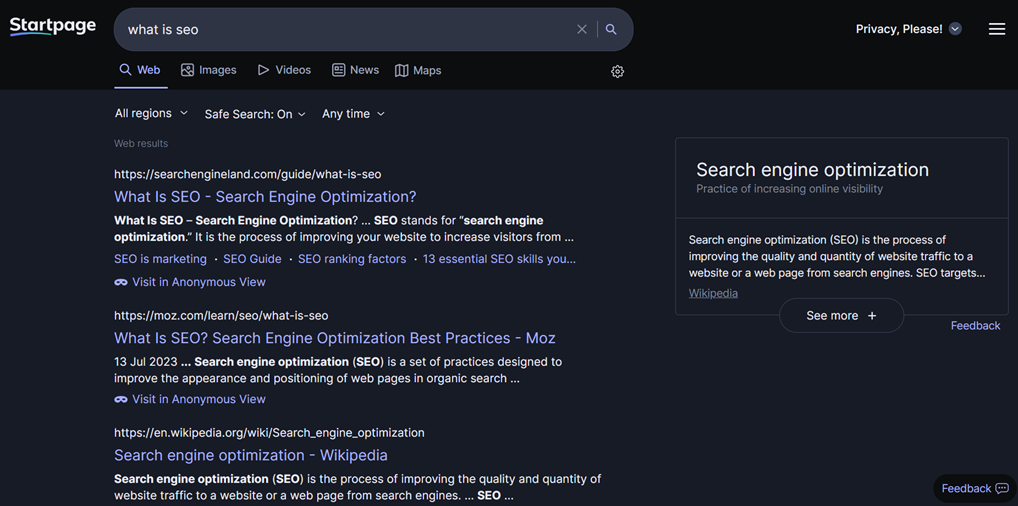
Startpage is a type of search engine that offers personal data protection, just like Bing. Startpage works as a clever middleman. It takes search results from Google and Bing, filters them, and then presents them to you without leaving a trace. No personal data is recorded, no search history is stored, and even your IP address is deleted from their servers.
What makes it special is its URL generator feature. With this feature, you can save your search settings without needing cookies.
Startpage also offers a smart proxy service, so you can click on search results and browse websites without the site. It also provides other products, such as StartMail, a secure email platform. It’s like having a digital vault for your communications, completing a truly private online experience.
- Widely used in countries: Netherlands (home country), Germany, Austria, US, etc.
- Pros: Highly secure privacy – no tracking or storage of personal data, high-quality search results from Google, unique URL generator feature for added privacy, no personalized ads.
- Cons: Search results may not be as personalized as Google or Bing, may be slower than direct search on Google due to intermediary processes, may have limited location features as it does not track user location, and may be less effective for very specific or local searches.
#8 Yandex

This search engine may not be too familiar to you, but it has great potential to become an alternative search engine.
Imagine a search engine that understands not only your language well but also the cultural context and local preferences. That’s Yandex. Born in Russia in 1997, Yandex has evolved into more than just a search engine. It is a digital ecosystem that offers a wide range of services, from mapping to voice assistants.
What makes Yandex so special? First of all, it is accurate in understanding the local context. It’s not just about language but also about understanding the nuances and specific needs of users in different regions.
Despite its strong dominance in Russia and some surrounding countries, Yandex is constantly trying to expand its reach globally. The English version is available at yandex.com, allowing users around the world to enjoy its search technology.
- Widely used in countries: Russia (nearly 71% market share), Belarus, Kazakhstan, Turkey, Ukraine
- Pros: Excellent local context understanding, integrated support features, Site Quality Index (SQI) that helps users identify high-quality sites, regionally relevant search results, and a global English version available.
- Cons: Limited global reach compared to Google, potential bias in search results, especially for politically sensitive topics in Russia, data leak in January 2023 raises concerns about security
#9 Naver
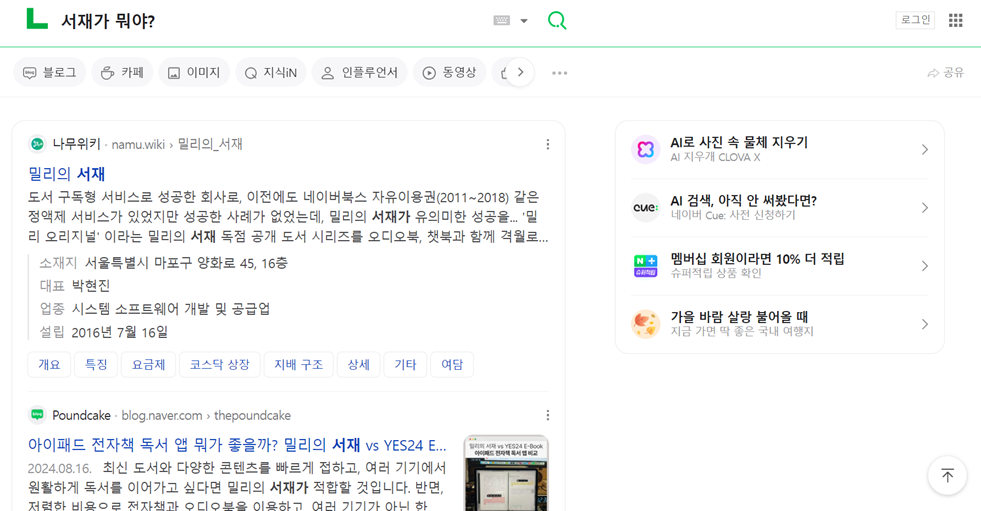
If the Baidu search engine is made specifically for local users in China, then the same is true for Naver Papago. It is a search engine created and focused on one country, South Korea.
Search results can range from those relevant to local culture and customs to unique services that portray the typical Korean society.
For example, Naver has special features to search for Korean recipes, K-pop trends, or breaking news that focuses heavily on developments in South Korea. This differentiates it from global search engines that tend to provide broader results but are less focused on the local context.
In addition, Naver has integrated various other services, such as Naver Maps, Naver Pay, and Naver Shopping, allowing users to perform various activities on a single platform. It is certainly more effective, so payments can be made without leaving the Naver ecosystem.
- Widely used in the country: South Korea (market share of about 58% monthly active users)
- Pros: focus on local Korean content and context, well-integrated services (search, news, blogs, music, shopping), highly relevant search results for Korean topics, robust mobile app for on-the-go searches
- Cons: limited global reach, mainly focused on the Korean market, less comprehensive English version, quite challenging for non-Korean speaking users (e.g. newcomers), potential information bias due to strong focus on local content.
#10 Brave Search
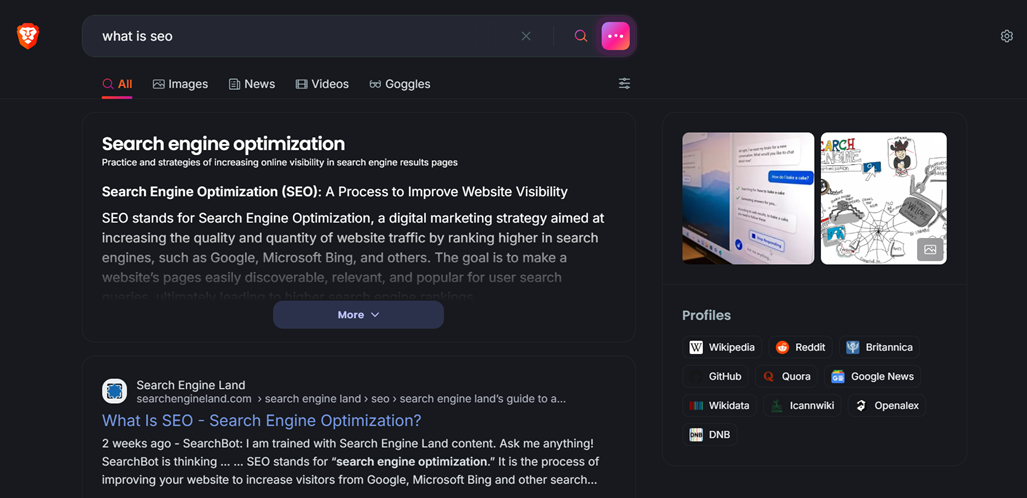
If you are very aware of your data privacy when browsing, it might be time for you to get to know Brave Search. Brave is a search engine that not only finds info for you but also protects your privacy. How cool is that? It’s here to protect your data from the prying eyes of the internet.
So, Brave Search is not just another search engine. It has a big mission, which is to provide a safe and snoop-free internet browsing experience. How does it do that? By not collecting your data at all. So, you can browse anything without fear of ads suddenly appearing on your social media or search engine.
Now, what makes Brave Search really different from others is that it has its web index. So, most of the ‘small’ search engines often share data with Google or Bing. But Brave? It’s independent, has its own data, and has its own algorithm. This means your search results can be more diverse, not just the same old stuff.
But don’t worry, if you’re still curious about Google search results, Brave has a “Google fallback” feature. So if Brave’s search results are incomplete, it will check with Google, too. Currently, it claims to hold 1% of the world’s search engine market share!
- Widely used in countries: Brave Search is used globally, but its popularity is high in countries with a high awareness of online privacy, such as the USA, Germany, UK, France, etc.
- Pros: It offers super secure privacy, does not collect user data, has its web index more diverse search results, can be used in all browsers, and has a reward program for watching ads.
- Cons: Search results may not be as comprehensive as Google’s (but there is a Google fallback option). It is still relatively new, so maybe some features are still under development. For those who are used to the Google interface, it may take time to adapt.
#11 Qwant
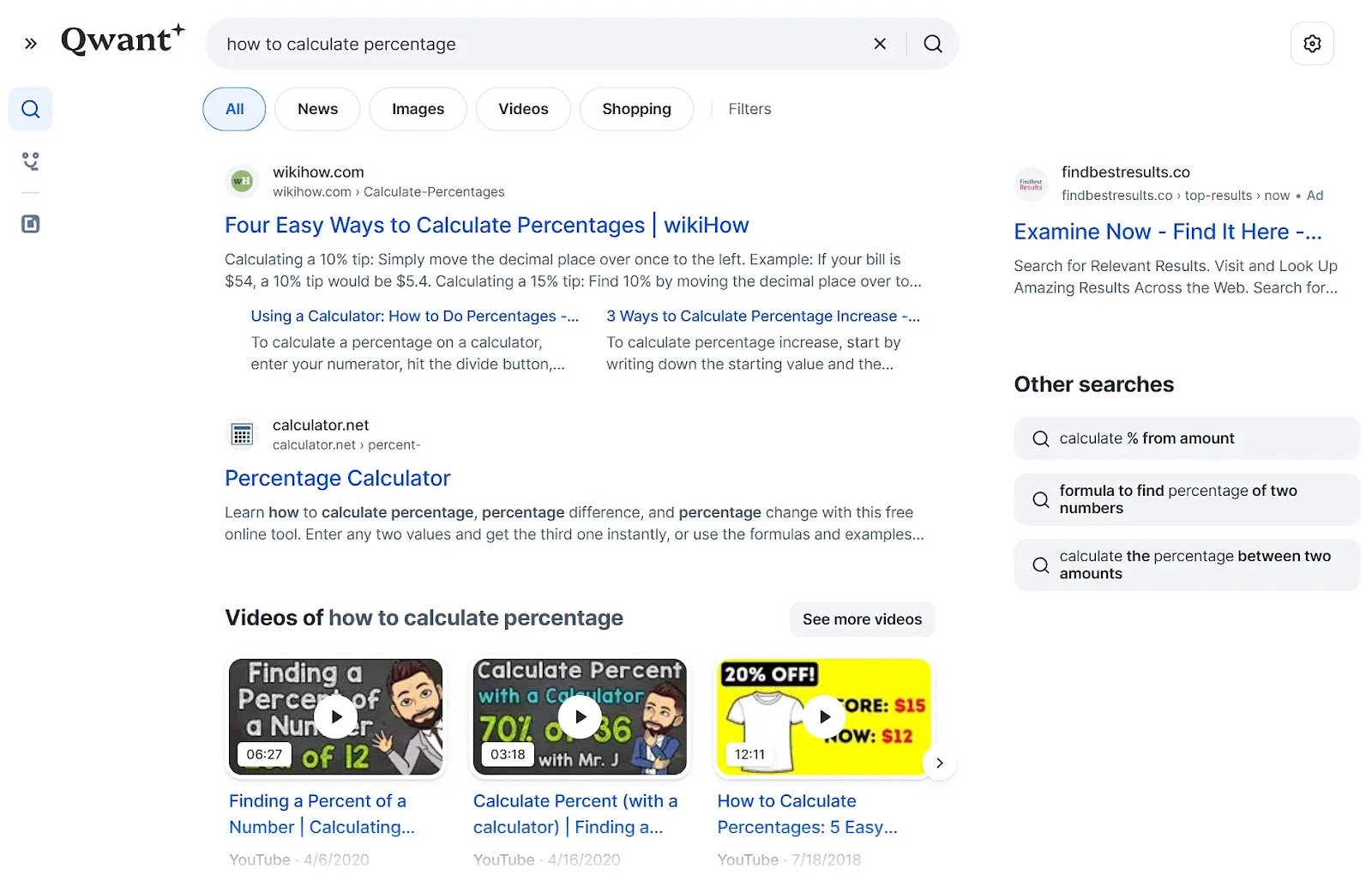
Similar to Brave Search, Qwant is also a search engine designed to protect user privacy from third parties tracking it. This search engine provides a safe browsing experience without sacrificing convenience.
For example, if you search for information on “how to get rid of acne,” you won’t be bombarded with ads for suspicious skincare products the next day, as is often the case with other search engines.
As a French search engine, Qwant offers a distinctly European look and feel, but don’t worry, there’s also an English version for international users. Although similar to Brave, the difference is the search results, as Qwant’s search results are mostly from Bing.
Interestingly, Qwant advertises without using cookies. This means that the ads are random and not based on your search history, although it may feel strange to see irrelevant ads.
- Widely used in countries: France (home country), Germany, Italy, Spain, US, etc.
- Pros: privacy maintained without tracking, available in English, suitable for international users, random ads that aren’t creepy or invasive, fairly accurate search results thanks to the partnership with Bing
- Cons: search results may not be as comprehensive as Google’s, no personalization, some search results may lack relevance, specific local information outside Europe may be harder to find, and some features are more focused on European users.
#12 Ask.com
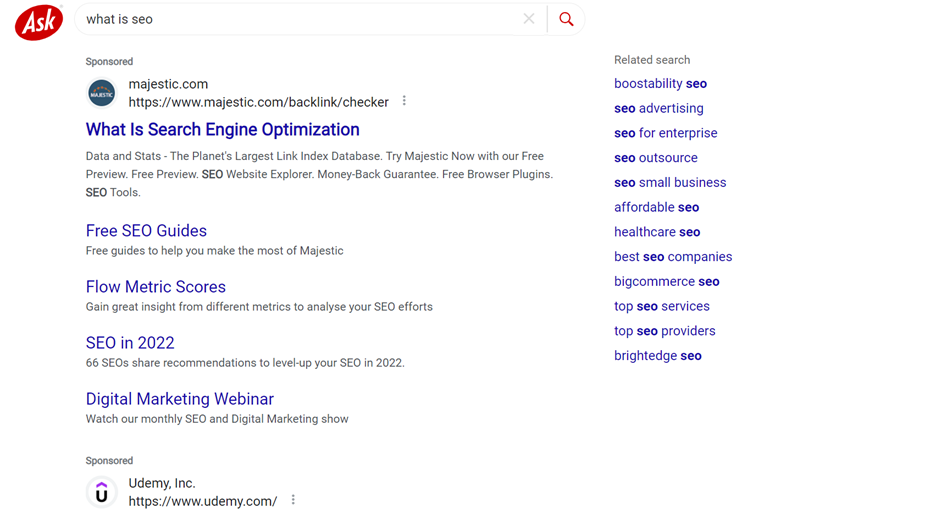
Maybe some of you have been bored with the same old search engine? It’s time to try exploring Ask.com, a search engine with a unique approach that might refresh your browsing experience.
Ask.com, formerly known as Ask Jeeves, has a long history since its inception in 1996. It was a search engine that allowed us to ask questions in everyday language as if we were talking to a personal assistant named Jeeves.
Over time, Ask.com has evolved into more than just a search engine. Now, it combines traditional search functions with a dynamic news platform. At the top, you’ll find the familiar search box, where you can type in any question or keyword.
What makes Ask.com different is the way it presents search results. Unlike Google, which usually places related searches at the bottom of the page, Ask.com displays them at the top.
- Widely used in countries: USA, Japan, UK, Germany, Italy, Netherlands, etc.
- Pros: Unique combination of search engine and news platform, prominent related search feature helps expand topic exploration, suitable for users who like to explore new information spontaneously, often more diverse search results than mainstream search engines.
- Cons: database may not be as extensive as Google or Bing, some users may feel annoyed by the large amount of news content on the main page, lacks the integrated service ecosystem that Google offers.
#13 Seznam
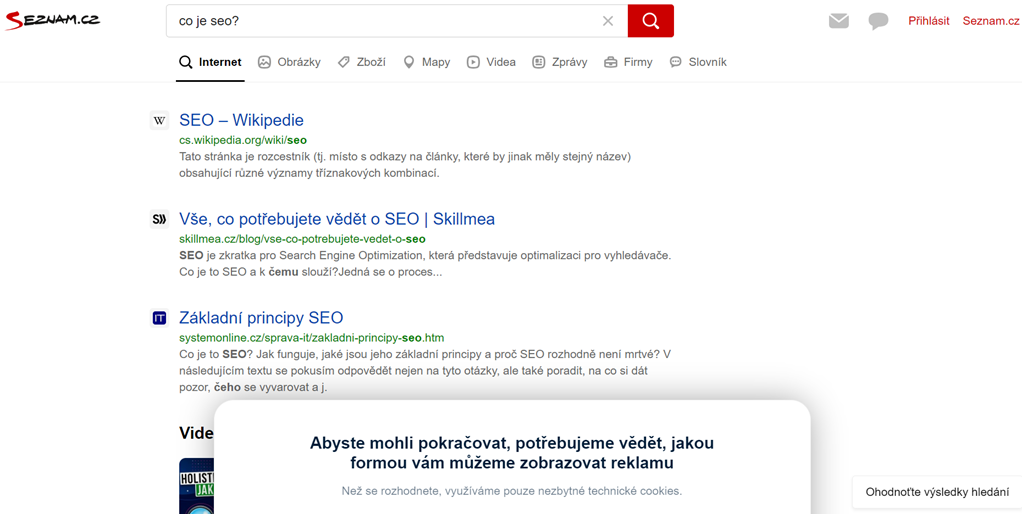
Have you ever encountered a tool that can compete with Google? Seznam is a search engine that challenges Google’s dominance in the local Czech market.
Seznam is not just a search engine, but a web portal that has become an important part of the Czech digital life. While Google still dominates globally, Seznam has managed to gain a significant local market share, reaching 12.78% in July 2024. This is a remarkable achievement given Google’s worldwide dominance. Seznam excels thanks to its highly localized approach, understanding the needs and culture of Czech users.
Seznam has a specialized web crawler called SeznamBot, which is designed to understand the Czech language and content better. They also have FreshBot, which is faster at presenting breaking news.
- Widely used in countries: the Czech Republic (main use), Slovakia (limited popularity), and some other Central European countries.
- Pros: deep understanding of local context and language, integrated with local services and content, FreshBot for quick access to breaking news, strong user loyalty in Czech Republic.
- Cons: Limited reach outside the Czech Republic, smaller database compared to global search engines, less effective for searches in languages other than Czech, heavy reliance on the local market.
#14 Lycos
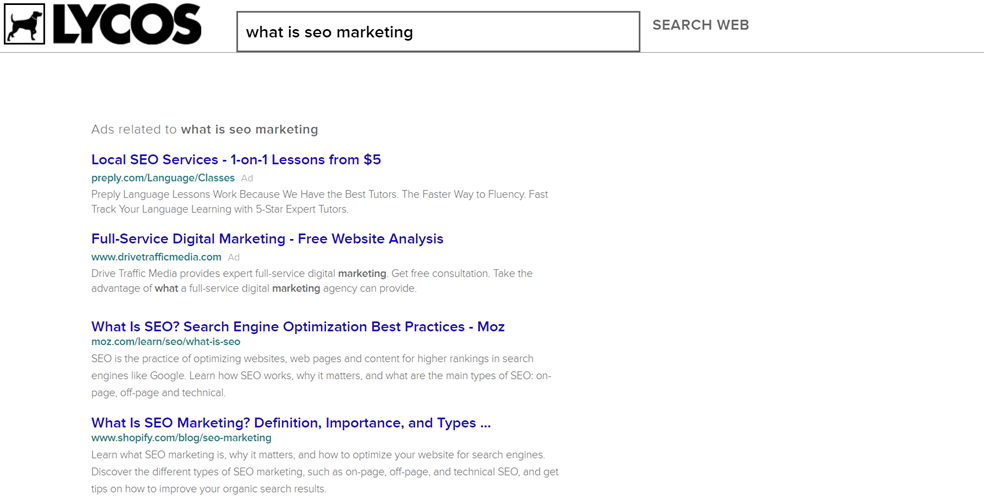
If you’re looking for a minimalistic search engine with few ads, perhaps Lycos would be a good fit.
When you first visit the Lycos page, you’ll be greeted by a very simple interface. In the center of the screen, there is a search box that invites users to type in the keywords or queries they want to find.
In addition, the search engine is not flooded with distracting ads or confusing visual elements, allowing users to search for information with more focus. However, it does not provide as many search results as Google or Bing.
Although its use is much reduced nowadays, Lycos remains an option for those who are looking for an alternative search engine with a simple look and less cluttered with ads.
- Widely used in the country: United States (especially in its heyday), some users in European countries.
- Pros: It has a very simple and minimalist look, provides quick and direct search results without beating around the bush, and features related search suggestions that help users find more information easily.
- Cons: limited search results compared to major search engines such as Google or Bing, may be less relevant for more specific or diverse searches, lacks many additional features or services offered by other major search engines, its usage has been much reduced, making it difficult to find the latest information or updates regarding Lycos
#15 AOL
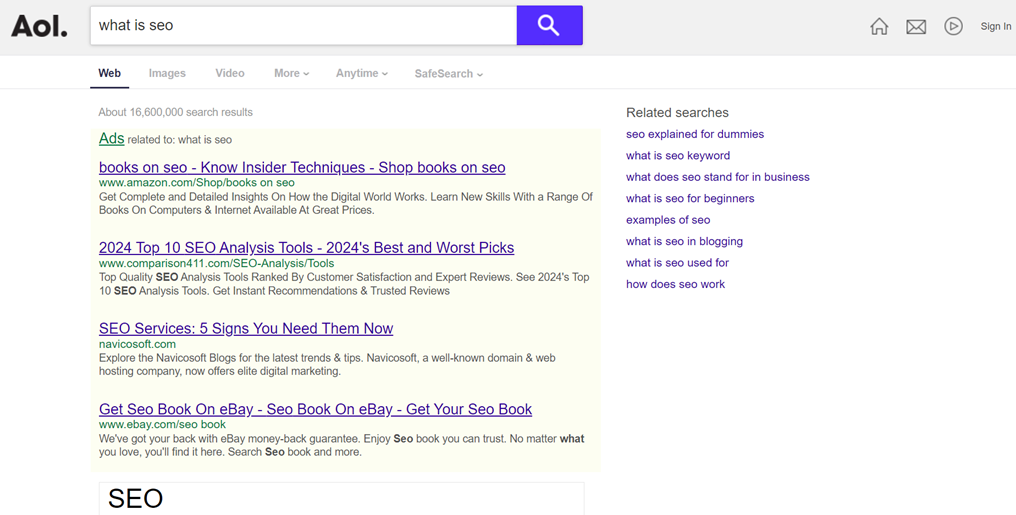
The last search engine that will be discussed is AOL (America Online). Although now better known as part of Yahoo, AOL still has a big influence on the development of the internet.
Unlike Google, which prioritizes broad search, AOL presents more curated search results, focusing on current news, entertainment, and a mixture of results from AOL-owned sites and external content.
One of the things that stands out about AOL is its approach to advertising. While AOL collects user data to customize ads, its approach to ad personalization is simpler than that of Google.
Rather than targeting ads based on in-depth analysis of individual behavior, AOL relies more on general demographic categories and user interests. This makes AOL an option for users who prefer news or entertainment-related information without the need for too in-depth user profiles.
- Widely used in the country: United States (especially during its heyday).
- Pros: Focus on curated content, such as national news and entertainment, search results that combine content from AOL itself with external sources, integration with Bing provides search results that are quite relevant and accurate.
- Cons: Very small market share, only about 0.09% in the US, which makes it less relevant than other major search engines, search results pages that are heavily populated with ads, and users do not get a highly personalized experience based on individual behavior.
Optimize your multi-language website for international search engine

Optimizing your multilingual website for international search engines is crucial, especially if you want to reach users abroad. Search engines like Google, Bing, and Baidu prioritize user experience and content relevance, meaning you need to provide your site’s content in multiple languages.
However, simply translating your content is not enough. To ensure your multilingual website ranks well in international search results, your site must be optimized with local SEO practices, including localized keywords, region-specific metadata, and well-structured URL systems.
This is where Linguise translation comes in to help you achieve this optimization. As an advanced multilingual SEO tool, Linguise automatically translates your website content and ensures it is tailored for various languages and regions. Some of the optimizations supported include.
- Automatic hreflang implementation
- Translation of meta descriptions
- Localization with a live editor
- Multilingual sitemap
- Implementation of canonical URLs, etc.
Conclusion
Now that you know which international search engines you can optimize for your website, it’s important to remember that each search engine has its strengths and weaknesses. You can decide based on your specific needs, target market region, or other factors.
To target international customers, it’s also essential to make your website available in multiple languages. Now is the perfect time to make your site multilingual with Linguise. It not only translates your content but also optimizes SEO so that users can easily find it! What are you waiting for? Create your Linguise account now and enjoy its exciting features!




